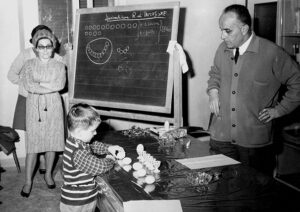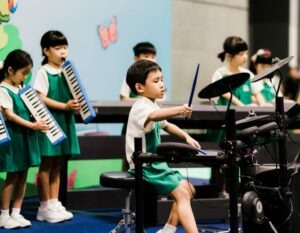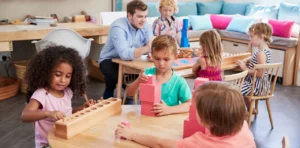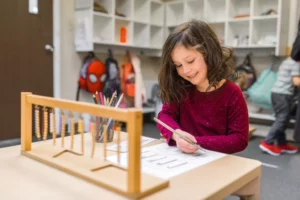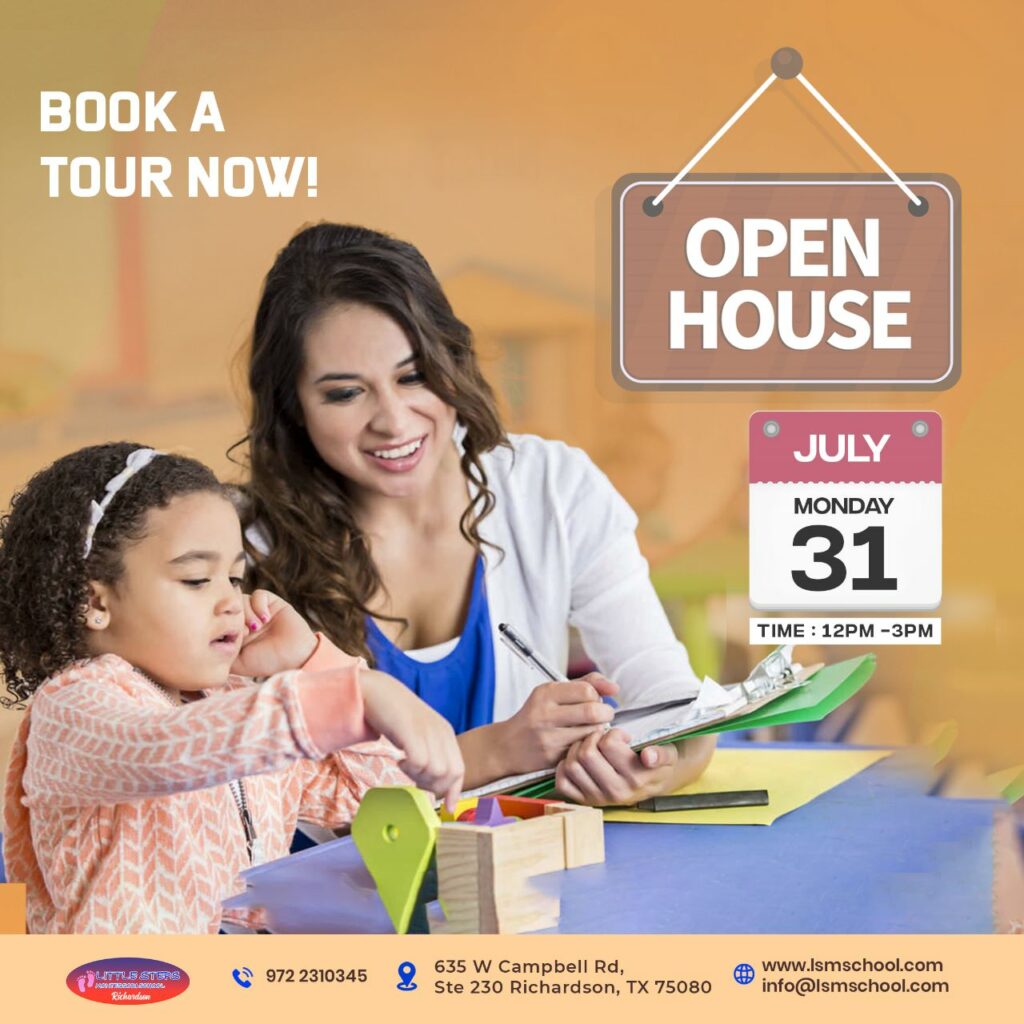Introduction: A Collaborative Journey
The Montessori method of education is not confined to the walls of a classroom but extends to every environment where a child learns and grows. Recognizing parents as essential partners in the child’s educational journey, Montessori schools foster a strong bond between home and school. This connection is more than a mere collaboration; it’s an alignment of values, methods, and goals to provide a consistent and enriching experience for the child.
Parent involvement in Montessori education is an essential aspect that extends beyond the conventional parent-teacher relationship. It fosters a strong bond between home and school by aligning values, methods, and goals. The Montessori philosophy views parents as the child’s first teacher, focusing on shared principles, holistic development, and community involvement.
Effective strategies for encouraging parent involvement include maintaining open communication, providing parent education, and offering volunteering opportunities. The impact of parent involvement greatly enhances the learning experience, builds trust, and strengthens the community.
The Montessori Philosophy: Education as a Partnership
Shared Values and Principles
Montessori educators work hand-in-hand with parents, ensuring they understand and support the fundamental principles of Montessori education. Regular meetings, workshops, and consistent communication help parents to understand their role in supporting their child’s development.
Parents are not just spectators but active participants in the Montessori method. They are viewed as the child’s first teachers and are encouraged to understand and integrate Montessori principles at home. Workshops, seminars, and open-door policies in schools often foster this involvement.
Holistic Development
The goal is not merely academic success but the overall development of the child. Parents are encouraged to create Montessori-friendly environments at home, promoting independence, creativity, and curiosity. A successful partnership in Montessori education requires alignment between home and school. Parents and teachers need to work together, maintaining open communication and mutual respect, to ensure consistent values, expectations, and goals for the child’s development.
Community Involvement
Montessori schools often engage parents in various activities and events, fostering a sense of community. This communal spirit ensures that everyone is invested in the success and well-being of each child. The partnership extends beyond the immediate participants, involving the community as well. Schools often engage with local communities to offer practical life experiences, connect learning to the real world, and instill a sense of social responsibility.
Effective Strategies for Parent Involvement
Clear Communication
Open and transparent communication between teachers and parents is vital. Regular updates, meetings, and open-door policies help maintain an ongoing dialogue. Regular newsletters, emails, or updates about the child’s progress and activities in the classroom. Encourage parents to visit the classroom, participate in activities, and observe their child’s learning
Parent Education
Workshops, seminars, and written resources provide parents with the tools and understanding they need to align their parenting methods with Montessori principles. Scheduled meetings to discuss individual child’s development, needs, and accomplishments.
Volunteering Opportunities
Parents are often invited to participate in classroom activities, trips, and special projects, bridging the gap between home and school life. Workshops to familiarize parents with the Montessori philosophy, materials, and methods. Encourage parents to be part of school committees or decision-making processes. Providing guidance and resources for Montessori-aligned activities at home.
The Impact of Parent Involvement
Enhanced Learning Experience
Children benefit enormously from a coherent and unified approach to learning. They experience less confusion and more support when the core principles are echoed at home. When parents understand the Montessori philosophy, they can extend learning at home, providing tailored support. Alignment between home and school practices enhances learning continuity, reinforcing concepts and skills.
Building Trust
When parents and teachers work closely together, a relationship of trust is formed. This trust is paramount in creating a secure and thriving learning environment. Engaging in educational activities fosters deeper connections and quality interactions between parents and children. Parents gain insights into their child’s interests, strengths, and challenges, nurturing empathy and responsiveness.
Community Strength
Parent involvement fosters a sense of community within the school. Parents become advocates, supporters, and integral parts of the educational process, enhancing not only their child’s experience but the entire school community. Parental involvement creates a sense of community, where education is seen as a shared responsibility. Active participation fosters a positive and supportive environment, enhancing the overall school climate.
Conclusion: A Unified Approach
The integration of parent involvement in Montessori education is neither incidental nor optional; it is foundational. The bond between home and school in the Montessori environment goes beyond traditional parent-teacher relationships. It’s a partnership that recognizes the importance of consistent values, mutual respect, and shared responsibility. It’s an acknowledgment that education is a collective endeavor, and when parents and schools work in harmony, the child’s potential is limitless.
Parent involvement in Montessori education is not just a complementary aspect but a vital component in the holistic development of a child. By actively participating in their child’s education, parents reinforce the Montessori philosophy of individualized learning, thereby extending the classroom into the home. This synergy creates a consistent and supportive environment that fosters academic growth, and social and emotional development, and cultivates lifelong learning habits.
Furthermore, this collaboration builds a unified educational community, where parents, educators, and children work together towards shared goals. While there may be challenges in maintaining this delicate balance, the positive impact on children’s well-being and success is profound. Thus, bridging home and school through parent involvement stands as a testament to the true essence of Montessori education, emphasizing partnership, respect, and the nurturing of each child’s unique potential.


